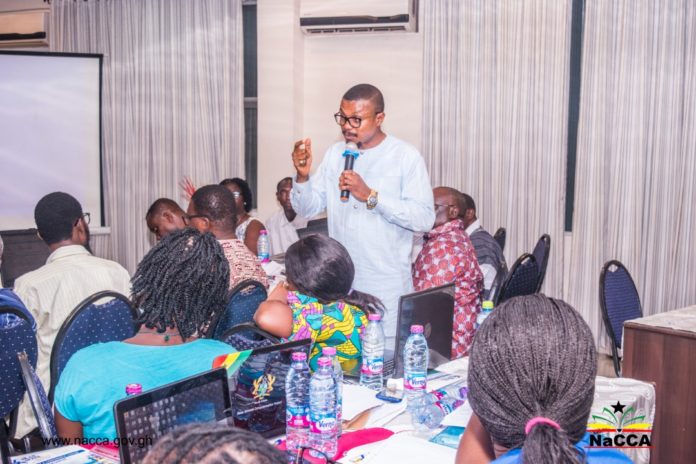|
Getting your Trinity Audio player ready...
|
The same curriculum that developed a good number of Ghanaian citizens over decades and provided brighter opportunities for them has also cut off an even greater number of citizens, prematurely determined their fate and left them with little or no hope.
That’s according to the Executive Secretary of the National Council for Curriculum and Assessment (NaCCA), Dr Prince Armah.
He was speaking to journalists in Accra about the soon to be introduced Common Core Programme which is the second phase of the ongoing educational reform in the country.
Likening the implementation of the current curriculum to “driving a Bedford” in the 21st Century, Dr Armah said it is time for the country to adopt a curriculum “that will be responsive to the needs of the 21st century.”
“The current curriculum is based on the 1950 model of learning… with emphasis on repetitive learning, drill and practice,” he said, but stated, in today’s technologically advanced world, the current generation of kids are no longer the same as those of the 1950s.
He said children are no more believed to be tabula rasa, adding, “science shows that even in the belly of their parent, babies are able to develop early language learning if their parents start reading to them during pregnancy.”
Performance under the existing Curriculum
Providing a gloomy picture about the performance of students at all levels under the current curriculum, Dr Armah said the national and international assessment of students at all levels give a huge source of worry.
He said the Early Grade Reading Assessment at Primary two has suggested that a whopping 98% of kids can read but cannot understand. This means only two percent can read and understand.
“At P4 and P6 the National Education Assessment (NEA) conducted by NaCCA and other organizations in Mathematics and English, shows that less than 25% can demonstrate proficiency in Mathematics for instance.
“Proficiency in Maths is 55% of the total score. Even that 55% is lower than the international benchmark which is around 65-70%. Even when we have lowered the benchmark we still have 25%.”
At the international level, he said Ghana used to take part in Trends International Science and Maths Study (TIMSS) in order to compare the performance of our students to their global counterparts as far as Science and Maths were concerned.
In 2003 when Ghana first took part, in the TIMSS assessment we were last but one, he said.
In 2007 again when we took part in the TIMSS again, we were second from bottom again, Dr Armah stated. Then in 2011 when we took part we were last and the country decided we were not going to take part in any international assessment anymore.
In all these studies, our children perform better on questions relating to recall of facts and figures, but perform poorly on questions emphasizing reasoning, problem solving and application of knowledge in everyday contexts.
“If you take all these pieces of evidence coupled with other research works, it’s not far-fetched to say that we are only preparing people to write exam and pass. But in today’s highly globally competitive world there is need for us to rethink the learning experiences we’ve been offering to our children. This is the basis for the curriculum review.
“We need a curriculum that will be responsive to the needs of the 21st century. We are no longer looking for graduates who will write and pass but graduates who are team players, problem solvers, critical thinkers, innovative and can communicate effectively to help solve many of our national problems,” he said.
He said the government has therefore decided to reform the country’s curriculum from KG to SHS which is now the new definition of basic school within the context of the free SHS programme.
The Standard Based Curriculum for the KG to P6 is now being implemented with the emphasis on the learners, not the teachers.
“We are not looking at the teachers setting objectives and they trying to achieve their own objectives. But we rather setting standards that we want the children, not the teacher to be able to know and demonstrate.”
“That curriculum is anchored on activity learning, problem solving and investigations to develop curious minds with critical thinking skills,” he added.
Common Core Curriculum
He said for purposes of consistency, the children who are going through the KG-P6 curriculum must be made to go through a similar curriculum which focuses more on doing and activity based, hence the Common Core Programme.
According to Dr Armah, the Common Core Programe which is expected to begin this academic year will see JHS 1 students studying only core subjects till end of SHS1.
“In all nine subjects, include Religious and Moral Education, Creative Arts and Design, Social Studies, Sciences, Computing, Career Technology, Physical and Health Education”, he added.
Dr Armah said the new curriculum is expected to build character and nurture values, in addition to ensuring a seamless progression for all learners from JHS to SHS and create clear pathways for academic and career related programmes from Basic 11 (SHS2) to Basic 12 (SHS3).
He further added that the CCP seeks to address the shortfalls in the current school system in relation to learning and assessment and promote better high school education that meets the varied learning needs of the young people in the country. A stakeholder engagement has been scheduled for Friday 28th February, 2020 at GNAT Hall in Accra to discuss the draft common core programme curriculum which has since been published online.
Source: Daily Mail GH





